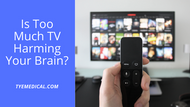Is Too Much TV Harming Your Brain? New Evidence Says ‘Yes’
Written by TYE Medical on Oct 31st 2022
If you needed another reason to put down the remote and engage your brain more actively, a new study published in the Proceedings of the National Academy of Sciences has given it to you. According to researchers, older adults who spend a lot of time watching TV increased their likelihood of developing dementia.
And yes, this study pointed to TV rather than to other forms of “screen time,” although other studies cite mindless scrolling as a factor. This doesn’t mean that TV causes dementia in someone who isn’t predisposed to the disease. But it does indicate that reducing TV time may reduce the risk for those who are more susceptible to the condition.
Here is a rundown of how different screens affect your cognitive ability and how you can make a change.
Why Is “Too Much” TV Bad for You?

Being physically sedentary is detrimental to brain health and doctors promote physical activity as a way to reduce dementia risk. But there is more to the story. If you’re going to engage in some sedentary activities (and we all do), it’s better to choose an option that’s more mentally active. TV watching falls into the “passive” screen time category. The level of cognitive activity that it takes to watch recreational TV is far less than the brain power it takes to use a computer, read a book, or even play a video game. (Not that we expect senior adults to take up gaming.)
The point is that mental activity matters for brain health. TV falls low on that scale and may actually work against you. Choosing sedentary activities that actively engage your brain has some benefits.
For example, computer use requires a higher order of cognition or thinking as you are directly engaging with information, reading, researching, typing, and any number of other activities that keep your mind engaged. But TV is consumed and generally not mentally stimulating as computer use or reading a book.
How Much TV Is Too Much?

According to the study, for every hour of TV participants watched per day, their dementia risk rose 24% (over the span of years).. But these folks weren’t watching an engrossing documentary. Their TV use was largely recreational. And according to some experts, it’s all about the content. Watching a documentary, whether it’s on the TV or your phone, requires a higher level brain function than watching an episode of “The Andy Griffith Show” or scrolling through social media on your phone.
Another study reported that after ten years of moderate TV watching, participants had less gray matter in their brains than those who rarely watched television. And in case you weren’t aware, the more gray matter in your brain, the better your cognitive skills. It’s as if watching TV drains your brain power.
In addition to watching more mentally stimulating television, it’s helpful if you’re watching TV while being socially active. This would mean watching with a companion and having engaging conversations as you watch wouldn’t have the same negative effect as watching alone or with little social engagement. Why? Social interaction sharpens your mind and is even recommended to seniors as a way of reducing dementia risk.
How Much Social Media Is Safe for Brain Health?

Since social media use also affects mental health and cognitive ability, it’s important to evaluate your habits. As with TV watching, it’s all about how you do it. Scrolling has the worst mood and cognitive effects and is often referred to as “mindless scrolling.”. This increases the likelihood of depressive symptoms, and too much passive social media use can have similar effects on the brain as too much TV.
Experts recommend 30-60 minutes of “social” social media use each day. This includes posting, engaging, and following friends you personally know. This will help you maintain a healthy balance without tipping into the negative range.
Screen Time Alternatives for Brain Health

To ensure you’re not overloading on screen time, try spending three to four hours each day with no screens. Yes–it’s possible!
The best use for your no-screen time–get physically active. When you include physical activity as well as mentally active engagement, you get a double brain boost. Try adding any combination of cardio, strength training, or even flexibility exercises like yoga.
And you’ll also preserve or increase cognitive function with brain activating activities like reading, puzzles (of any kind), learning a language, learning a new hobby, or using your creative skills to create visual or verbal art (like a painting or a short story).
Assessing Your Screen Time
Wondering if your screen time is too much? Consider these five important questions to help you evaluate your usage:
- Are you sleeping well?
- Are you eating well? (No change in appetite?)
- Are you getting out of the house and engaging socially?
- Are you able to focus and stay motivated at work?
- Are you physically active?
If all is well in the above areas, then your screen time is probably appropriate. But if any of these areas are problematic, it’s possible that you’re getting too much of the wrong kind of screen time.


